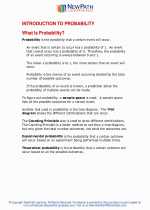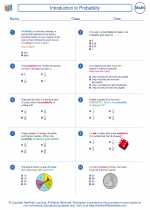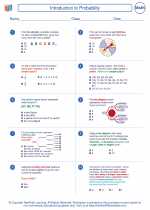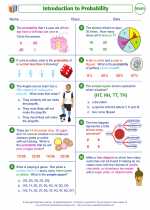Introduction to Probability
What is Probability?
Probability is the likelihood of a specific event occurring. It is expressed as a number between 0 and 1, where 0 indicates impossibility and 1 indicates certainty.
Basic Concepts
When working with probability, it's important to understand some basic concepts:
- Sample Space: The set of all possible outcomes of a random experiment.
- Event: A subset of the sample space, which is a collection of one or more outcomes.
- Probability of an Event: The likelihood that a specific event will occur, denoted by P(event).
Calculating Probability
There are different ways to calculate probability, depending on the type of experiment:
- Classical Probability: Involves equally likely outcomes, and is calculated using the formula P(event) = (number of favorable outcomes) / (total number of outcomes).
- Relative Frequency: Involves conducting an experiment and determining the probability based on the observed frequency of the event.
- Subjective Probability: Involves using personal judgment or experience to determine the likelihood of an event.
Study Guide
Here are some key concepts to focus on when studying probability:
- Understanding the sample space and events.
- Calculating probabilities using the classical method and relative frequency.
- Recognizing the difference between theoretical and experimental probability.
- Practicing with different types of probability problems, such as independent and dependent events.
with Math Worksheet Generator
◂Math Worksheets and Study Guides Seventh Grade. Introduction to Probability
Study Guide Introduction to Probability
Introduction to Probability  Worksheet/Answer key
Worksheet/Answer key Introduction to Probability
Introduction to Probability  Worksheet/Answer key
Worksheet/Answer key Introduction to Probability
Introduction to Probability  Worksheet/Answer key
Worksheet/Answer key Introduction to Probability
Introduction to Probability  Worksheet/Answer key
Worksheet/Answer key Introduction to Probability
Introduction to Probability 

 Worksheet/Answer key
Worksheet/Answer key
 Worksheet/Answer key
Worksheet/Answer key
 Worksheet/Answer key
Worksheet/Answer key
 Worksheet/Answer key
Worksheet/Answer key

The resources above cover the following skills:
Data Analysis and Probability (NCTM)
Understand and apply basic concepts of probability
Use proportionality and a basic understanding of probability to make and test conjectures about the results of experiments and simulations.
Connections to the Grade 7 Focal Points (NCTM)
Probability: Students understand that when all outcomes of an experiment are equally likely, the theoretical probability of an event is the fraction of outcomes in which the event occurs. Students use theoretical probability and proportions to make approximate predictions.